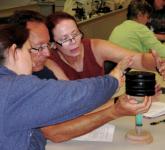COSEE-OS is dedicated to fostering educator-scientist collaborations with a focus on investigating how inland audiences can better understand
how the oceans affect their everyday lives. Since 2006, over 100 educators from 18 states -- as far away as Idaho and New Mexico -- have
participated in summer professional development workshops at the
University of Maine
and the
University of New Hampshire. Some of our workshop
attendees have been sponsored to
participate in national conferences.
Based on experience from these and other COSEE-OS initiatives, we have crafted a new model of "Scientist-Educator Workshops" to co-create
online learning resources that align with National Science Education Standards, Climate Literacy and Ocean Literacy Principles. Each workshop
focuses on the current research topics of the internationally known scientists who participate fully in all aspects of the workshop. Pedagogical
techniques such as
concept mapping and on-line collaboration
tools are employed to foster sustained interactions between the educators and scientists.
Visit our
workshops page
for information on
past events; for upcoming
workshops, click
here. For information on
how some educators are using our tools in their classrooms, click
here.
COSEE-OS engages audiences in
free public webinars to help scientists and ocean
science content reach broader audiences. Many of our webinar participants are educators. Since 2010, COSEE-OS has pioneered several webinar
models, and continues to test the application of webinars to different audiences. All that is needed to participate in a scheduled webinar is
a phone and an internet connection. Participants can ask questions and participate, making the session both interactive and informative.
Perhaps our most ambitious and innovative achievement has been development of the
Ocean Climate Interactive
which highlights fundamental science concepts as well as their "big picture" connections. This software tool ties directly to hundreds of
resources including those for pre-college audiences. Some of these resources have undergone extensive
review by teams of scientists and educators.
We have also offered a
college course co-developed by professors from the University
of Maine's College of Education and School of Marine Sciences. Designed for pre-service educators and marine sciences majors, the course
utilized an inquiry-based instructional approach to learn about physical sciences content and relevant ocean examples that could be used to
illustrate them.
For more information, please contact
Annette deCharon.






